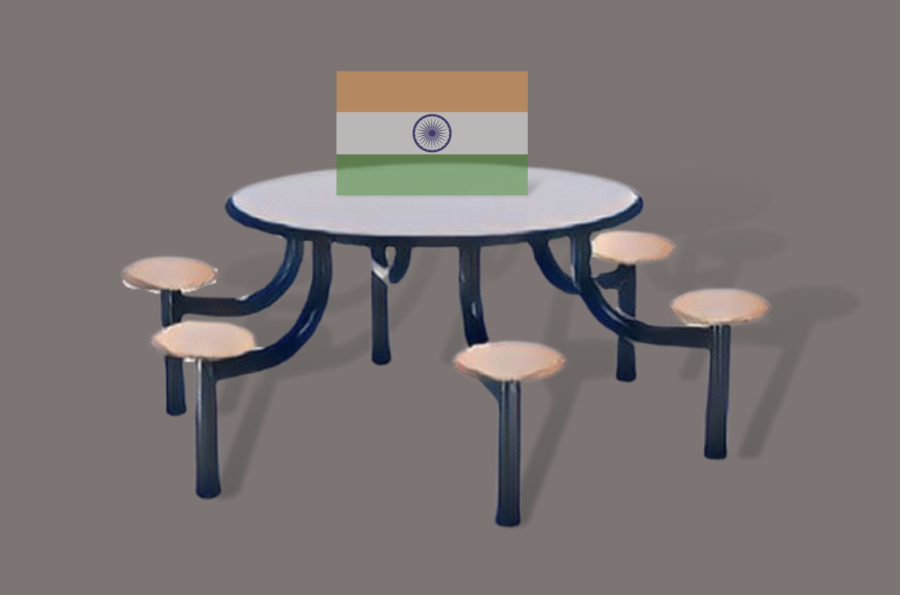Opinion: Stereotypes do not tell the stories of their targets
Credit: Reva Datar
WSPN’s Reva Datar discusses the effects of South Asian stereotypes.
June 4, 2022
As the students gathered around the table, they all took out the lunch their mothers had packed for them, or the lunch they picked up from the hot lunch line. One took out neatly cut sandwiches, another took out a thermos steaming with pasta. I took out my glass tupperware filled to the top with Biryani from the night before. Unfortunately, once I opened the lid to enjoy my meal, the smell of Indian spices was not the only thing I was met with.
After incidents like these, I refused to bring Indian food to school for the next three years. I would give my lunch to a classmate who expressed interest in a unique dish I’d brought that day, though I couldn’t understand why, and would pick up a slice of pizza or nacho cheese from the hot lunch line. With this, shame bubbled over in me. Shame and embarrassment for the food I brought to school, shame for the way my name did not roll naturally off the tongue of most Americans but also shame that I neglected the culture, love and time my mother invested in me.
It truly is a dilemma for people who have a background that does not align with the widespread and normalized Western culture. How can we express and accept who we are without turning the heads of those who are different from us?
Now, as years have gone by and I’ve lived through my first year of high school, the role my ethnicity and culture has played in my life has dramatically changed. The way that people around me interact with it has also evolved from immature judgment to being more educated with society’s sudden shift. While I do not try to actively be an Indian everyday, this part still has an impact on my everyday life.
For South Asians, or Indians in my case, there are many stereotypes that craft the “average” Indian. Through Orientalist beliefs, among other things, we are perceived to have a mysterious, exotic culture which has been painted as inferior to that of the west. Hinduism is one of the characteristics wrongly associated with all Indians, and in turn was interpreted differently by the west because of its polytheistic classification.
To this day, Hinduism stands out as one of the main characteristics of the Indian reputation in the western world. Additionally, India as a country today is perceived to be poor, where the majority of people live impoverished, uneducated and have dirty habits. India’s so-called “tribal” practices are seen by the western world as barbaric and sometimes even violent. Women in Indian society are subordinate to men, which under no circumstances is justifiable. However, this is an exaggerated fact and is not unique to just Indian society.
To describe these stereotypes as hurtful lies would be a massive understatement. Many, if not all these demonstrations of mockery of Indians originated from a British perception. Centuries ago Britain aimed to justify its brutal and foul colonization of India to further strengthen its own empire at the expense of Indian people.
Indeed, many of the stereotypes in society today on the basis of someone’s ethnicity or nationality were derived from an exaggerated phenomenon. Some of them were completely made up to cause harm to one and inherently benefit another. This is evident in the global discrepancies we see across the world.
We observe and assume countries in Asia and Africa are filled with unrest and we conclude that people are helpless and oppressed. Western countries highlight themselves as examples of “prosperous” countries and allow the media to spread inaccurate information.
Yes, our perceptions of countries in the world do create biases. They impact the way we see those in our everyday lives who we may subconsciously associate with a certain country or background. While many may say they do not see color or race, this statement becomes less believable as racism in our society continues to be prevalent. Spreading awareness about different identities and debunking the stereotypes does not change how plagued our world is by them.
The acquisition of certain biases and opinions are inevitable, since they have been enforced and hammered into society for centuries. The effects of the spread and enforcement of stereotypes still exist today, creating an environment where in India, one can walk in a room wearing a western suit without drawing attention, while in America, one who walks into a room wearing traditional Indian clothing draws attention.
Indeed, my lunch brought attention from those around me, even though I did not do anything perceived as unordinary to attract it. However, as I and those around me grew older and learned more about the world, our understanding of race and its role as a social construct grew bigger in our lives.
Through movements concerning race across the country in reaction to police killings and hate crimes against Asians, race has been brought to the forefront of everyone’s minds. The color of one’s skin draws attention and assumptions the moment it is factored into the subconscious profile we make., This is a sad reality that is true due to society’s – but also individuals – lack of social reform throughout the last decades. However, we cannot use imperial dominance to justify our psychological reinforcement of these stereotypes.
Though societies are built on the basis of class and race, our biases and predetermined notions are harmful to those around us. These unfair judgements hinder their chance to show how they may not conform to stereotypes that we associate with them. Though it is difficult, we should encourage those around us to share their stories and experiences, whether or not their identity truly does affect the way they behave or how they perceive themselves.
To return to the question I asked before: How can we express and accept who we are without turning the heads of those who are different from us? Rather than individuals conforming to stereotypes and aligning themselves with a story, they themselves should narrate and decide what this story is.
Perhaps if, back then at the lunch table, I was in an environment where the default was not a general acceptance of western culture, I would not have shunned my own culture and believed stereotypes that put me down and the limits of my worth. There should be no pressure for people to act a certain way and meet a criteria for them to be characterized as a type of person. People’s stories stretch further than where they are from and who we say they should be, so let’s start to acknowledge that.





![Last Wednesday, the Wayland School Committee gathered to discuss a number of topics regarding the health curriculum and Innovation Career Pathway course. Another large topic of conversation was the ways to potentially mitigate distracting cell phone usage. "These [phones] are going to distract your learning and social relationships," Superintendent David Fleishman said. "That's concrete right there."](https://waylandstudentpress.com/wp-content/uploads/2025/06/Screenshot-2025-06-04-at-9.49.31 PM-1200x886.png)



























![Troy Hoyt finishes the Boston Marathon, running for the Hoyt Foundation. T. Hoyt is the son of Hoyt Foundation CEO Russ Hoyt.
“[Running a marathon] might seem like a big thing, when it’s presented to you at first, but if you break it up and just keep telling yourself, “Yes, you can,” you can start chipping away at it. And before you know it, you’ll be running the whole 26 miles, and you won’t even think twice about it.” T. Hoyt said.](https://waylandstudentpress.com/wp-content/uploads/2025/04/C36E8761-1CBB-452E-9DF2-543EF7B1095E_1_105_c.jpeg)













































